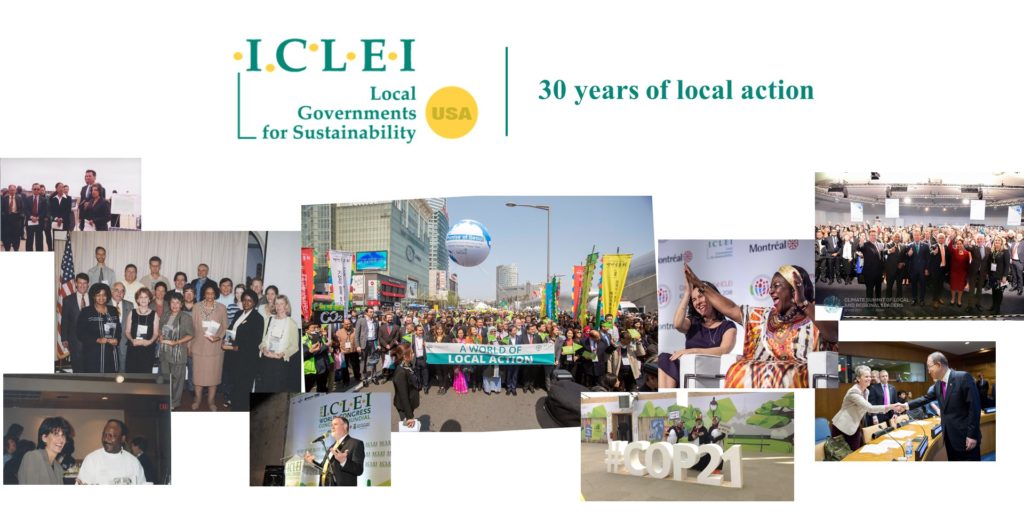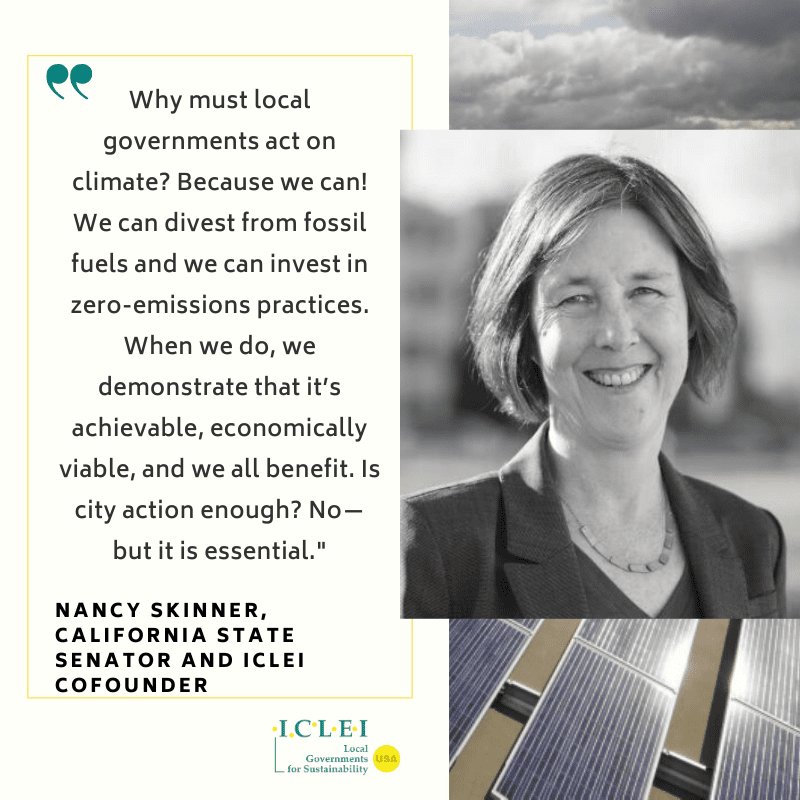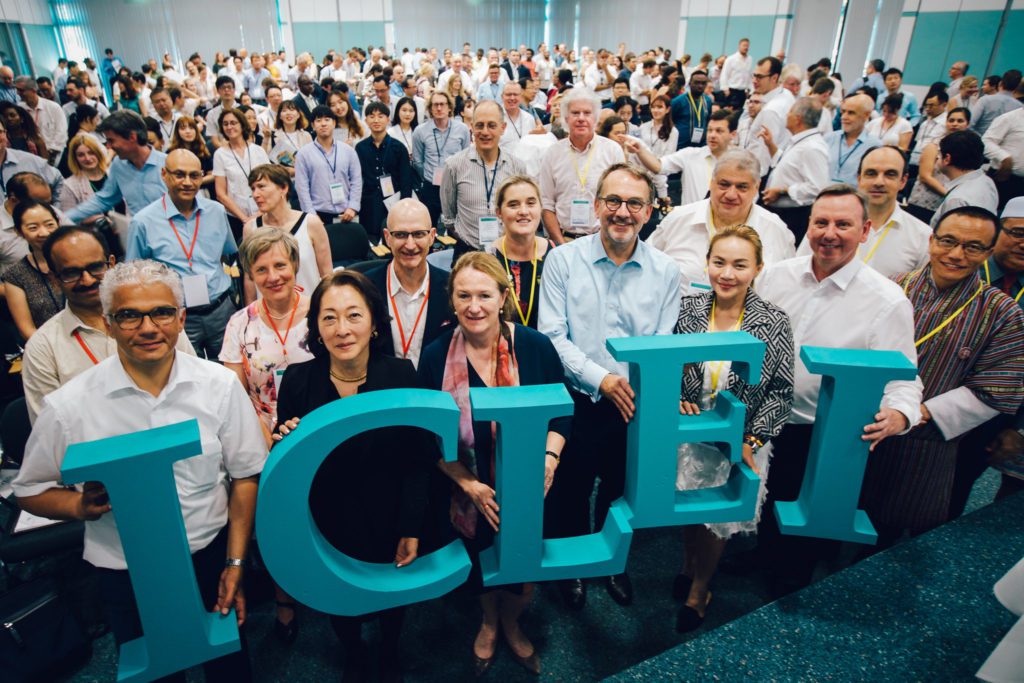
In September 2020, ICLEI celebrates 30 years of advancing local-level sustainability action. Read our founding documents —including the Charter for the “International Council on Local Environmental Initiatives”, signed on September 8, 1990—compiled by researcher Ben Leffel and housed in the University of California-Irvine archives, check this page for updates and our year-long #ICLEI30 communications campaign on social media, where we’ll be highlighting the people and places who have shaped ICLEI USA over the past three decades — and the action we’re moving on for next decades.
On September 5, 1990, local government officials representing 200 cities from 43 nations gathered at the United Nations in New York. These mayors, council persons, and city staff from locales as distant from each other as the United States, Ivory Coast, Canada, Mexico, Brazil, Finland and the Soviet Union, brought with them the resolve that, regardless of what goes on in world geopolitics, local governments are ready to collaborate and share solutions to create a fair, sustainable future for their cities and regions. They would not wait for nations to act in order to protect an environment that underpins the economy and quality of life in their hometowns.
Three days later, on September 8, the Charter for this new group, co-developed by Jeb Brugmann and Nancy Skinner, was signed and ratified.
That initial convening came to be called the International Council for Local Environmental Initiatives, or ICLEI, and proceeded to cement an official role with the United Nations that continues to this day.

ICLEI’s Founding Cities
Today, ICLEI-Local Governments for Sustainability is internationally recognized as the leading network for cities and regions dedicated to sustainable development. As the focal organization to the Local Government and Municipal Authorities (LGMA) majors group at the United Nations’ climate body, ICLEI is both advocate and implementing partner to our members. But before this international role was so firmly established, ICLEI got its start in a few visionary North American cities.
Indeed, the stirrings of a city-led sustainability network can be traced in part to City of Irvine, CA, where, in summer 1989, then-Mayor Larry Agran ushered a first-of-its-kind local ordinance restricting the use of ozone-depleting chlorofluorocarbons (CFCs). Mayor Agran predicted other cities would follow and they did. By July, a two-day conference in Irvine convened 24 U.S. and Canadian cities to explore how local governments could combat depletion of the ozone layer. They called themselves the North American Congress of Local Governments for a Stratospheric Protection Accord. City of Irvine’s national and global peers transitioned their scope beyond CFCs to consider all environmental pollution the following year during the UN conference mentioned above.
Some of the founding members of ICLEI unsurprisingly continue to be at the forefront of local government environmental leadership: Tucson, AZ; Saint Paul, MN; Berkeley, CA; Miami-Dade County, FL; San Diego, CA; Portland, OR; and Santa Monica, CA.
To this day, ICLEI’s U.S. office, ICLEI USA, remains among the largest with its founding cities continuing to lead, particularly in the area of climate action and greenhouse-gas emissions management. ICLEI USA’s Five Milestones for Emissions Management framework has been used by more than 600 U.S. cities over the past 30 years to guide climate action and has formed the foundation of several leadership commitments beginning with the Clean Air and Climate Protection (CACP) program. In 2007, ICLEI teamed up with U.S. Green Building Council and Center for American Progress to establish a Green City Index — which came to be known as the STAR Communities Program. Recognizing that climate action could benefit from a standards the same way sustainability action did, ICLEI developed the Local Government Operations and Community GHG Inventory protocols in 2010 and 2012. And in 2013, ICLEI released the ClearPath tool, a cloud-based, update to CACP that continues as the leading software for local governments.
Thirty years ago, ICLEI’s founding Secretary General, Jeb Brugmann, wrote that “by the end of the century, half the world’s population will live in cities”. These projections not only turned out to be almost on target — the UN estimates 2007 was the year when, for the first time, more people in the world lived in urban than in rural areas — but that the trend is accelerating, so that two-thirds of the global population is expected to be urban by 2050. ICLEI’s pioneering work as advocate and technical resource for cities, towns, and counties has only grown in importance over the past 30 years and is intent to carry these strengths forward, on behalf of its global network of 1,750 local governments, into the decades to come.
University of California-Irvine researcher and honorary ICLEI historian, Benjamin Leffel, recounts the history of ICLEI beginning in founding city Irvine, Calif.
2-Part Web Event Connects Local-to-Global Action: Past, Present and Future
Since that initial UN meeting 30 years ago, ICLEI has grown to more than 1,750 local and regional governments of all sizes working in more than 100 countries on nearly 200 active sustainability projects. Those working to advance the UN’s Sustainable Development Goals will appreciate that an ICLEI project exists that addresses every SDG. More than 50,000 local government staff have benefited from over 1,000 capacity-building events, and ICLEI remains the only local government network that is accredited as observer at the three Rio Conventions, namely UN Framework Convention on Climate Change (UNFCCC) under which the Paris Agreement was adopted; the UN Convention on Biodiversity (CBD); and the UN Convention on Desertification (UNCCD).
U.S. cities remain at the forefront. In 2019, ICLEI USA assisted 118 local governments to create greenhouse gas inventories, and 70 are working to develop an emissions-reduction target with another 24 developing a climate action plans. Through ICLEI’s innovative cohort-training model, dozens of member cities will develop integrated climate action plans in 2020 — bringing adaptation, mitigation, nature-based solutions and equity into a single effort — along with cutting-edge GHG inventories for consumption and forest-based carbon accounting, and SDG-aligned sustainability plans that support local engagement with the UN.
Two September 2020 web events recount these experiences and how the work can continue forward for local govenrments. On September 2, ICLEI leadership is joined by the U.S. House of Representatives Select Committee on the Climate Crisis for an overview of the What the Solving the Climate Crisis Report means for local governments:
Then, on September 23, the ICLEI Director of Global Policy, Yunus Arikan will be joined by the architects of the original ICLEI Charter, Senator Nancy Skinner and Jeb Brugmann, alongside city-diplomacy researcher Benjamin Leffel for a deep-dive into how local governments can connect to local processes. Register for the September 23, 11am Eastern event here.
The Next Decade
At the global level, a new 10-year initiative we’re calling #UrbanEra4Life, developed by the hometown of ICLEI World Secretariat, City of Bonn, Germany, in cooperation with ICLEI, headlines the road to the next UN climate talks in 2021. Engage with the local advocacy agenda at Cities-and-Regions.org.

Kale Roberts is Senior Program Officer at ICLEI USA, where he provides member cities with technical support on climate, resilience, and sustainability action. He serves as network coordinator and communications lead and support local government connection to United Nations processes.